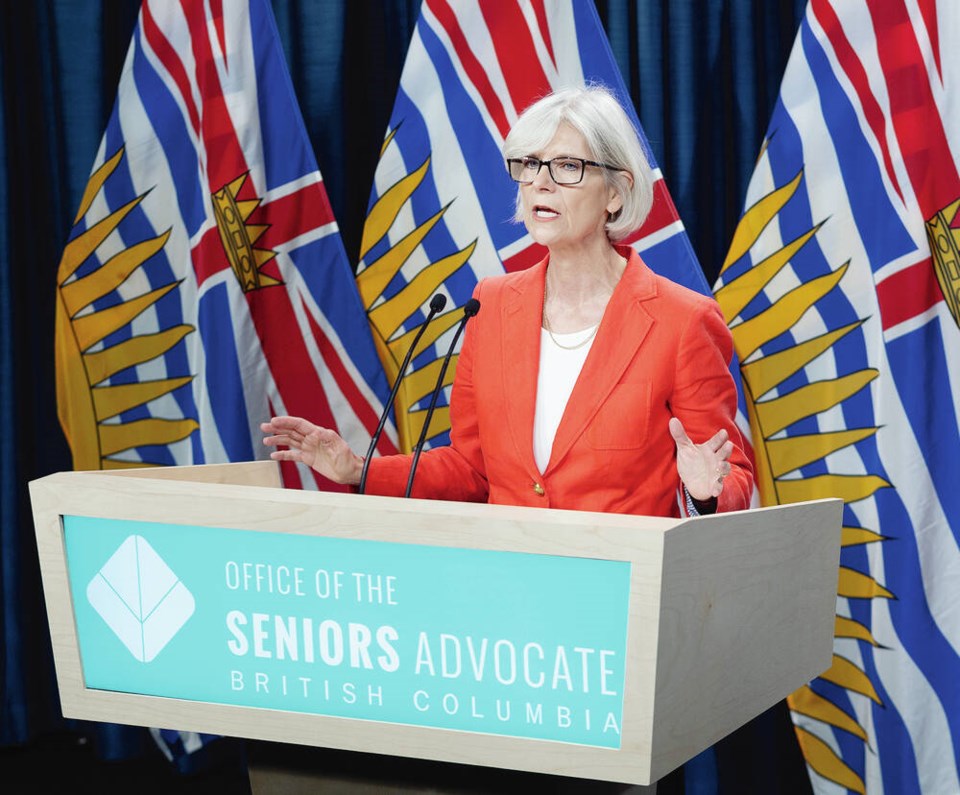B.C. seniors are struggling to pay for rent and home support and the problem will only worsen as the population ages and grows over the next decade, says B.C.’s seniors advocate, in her final report before retiring this month.
Isobel Mackenzie released on Thursday her annual Monitoring Seniors Services report, a statistics-packed 71-page document that looks at five-year indicators on seniors’ wellbeing.
She noted that the oldest baby boomers are only turning 78 this year, but health-care demands spike after age 85.
“The big bulk of our population is going to shift into that cohort over the next 10 years,” said Mackenzie, whose report notes that the majority of seniors — the highest percentage of whom are on Â鶹´«Ã½Ó³»Island — are living well into their 80s.
“I think that governments have to recognize that, and the public has to recognize that, as we plan for the future.”
Mackenzie said subsidies for the one in five seniors who rent have fallen “dramatically short” of what they need to continue living independently.
“Everybody wants the seniors of this province to enjoy a dignified and safe life in retirement years,” she said. “However the pressures that are coming — you can see that in population data — are significant and the cost of what is needed to provide those supports are also increasing.”
Last year, seniors comprised about one million of B.C.’s overall population of 5.5 million and that percentage is growing.
The advocate’s report shows the median income for seniors in B.C. is $33,150, meaning 50 per cent of seniors have an income that’s below minimum wage.
Almost one-third of B.C.’s seniors population receives the Guaranteed Income Supplement, which indicates their incomes are below $25,000 a year.
Mackenzie has long argued that the rent subsidies — Shelter Aid For Elderly Renters — provided by B.C. Housing for low-income seniors age 60 and up are in drastic need of updating.
While 80 per cent of seniors own their own home, about 20 per cent rent and 25,506 seniors with an average annual income of just $20,800 last year received the SAFER subsidy.
While the average one-bedroom rent in Â鶹´«Ã½Ó³»last year was $1,696, the rent “ceiling” on which the subsidy is based would be just half that at $803. Every dollar above that in rent is unsubsidized, she said.
“I cannot emphasize enough the challenges with this program,” said Mackenzie. “And while it is well intended, it is not meeting the needs of senior renters.”
B.C. Housing is working on it, she said, “but they have been working on it for a rather long time.” It could be changed overnight, she said.
Mackenzie wants to see seniors’ rents kept to 30 per cent of income and the ceiling “raised significantly” to the average rent and increased yearly to reflect annual allowable rent increases.
For seniors living in rent-controlled units and forced to move, the rent hike can be “catastrophic,” said Mackenzie.
As for subsidized housing for seniors age 55 and older who pay 30 per cent of their income toward rent, “there’s too many people chasing too few units,” said Mackenzie.
Despite a six per cent increase in the number of units over the last five years, there’s been a 58 per cent increase in applicants. The average wait time is 2.7 years, with some people waiting more than five years, she said.
Another challenge that has yet to be addressed in B.C. is the cost of home-support services, about $9,000 a year based on a $29,000 annual income, said Mackenzie. B.C. is one of just a few provinces to charge for home support and is the most expensive.
Mackenzie argues a lack of affordable home supports and community supports such as adult day programs drives seniors and their caregivers towards long-term care, where there is growing demand and increasing wait times.
There are about 29,430 publicly subsidized long-term care beds in 297 sites in B.C.
While the number of publicly subsidized sites and beds has increased by three per cent over five years, the rate of beds per 1,000 population for those age 75 and older has actually decreased 12 per cent during the same time period based on population growth.
Last year, there were 5,175 clients waiting for a publicly subsidized long-term care bed, with the average wait time 215 days.
Mackenzie said there’s been a 136 per cent increase in the time clients have waited to be admitted.
The , which covers trends in health care, community supports, income, transportation and safety, also shows “concerning trends” of abuse, neglect and property crime against seniors that likely warrant discussions with law enforcement, said Mackenzie.
She noted that 29 per cent of long-term care residents were on anti-psychotic medications without a diagnosis of psychosis in 2022-2023, the highest rate in five years, and above the national average.
“I do think that’s an area we have to revisit,” said Mackenzie.
The report can be found at
B.C.’s new seniors advocate is Dan Levitt, an adjunct professor of gerontology at Simon Fraser University and the head of a non-profit long-term care home.



